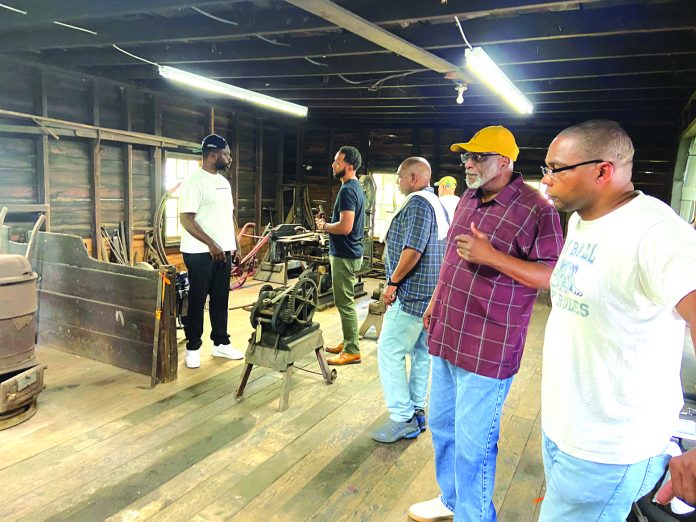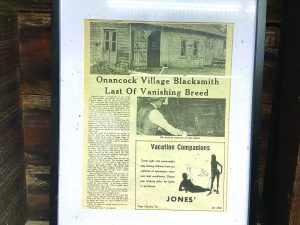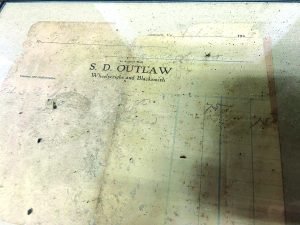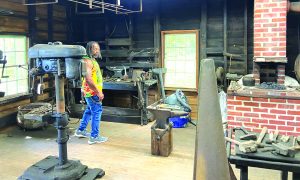
By Carol Vaughn —
A group from Birmingham, Ala., visited the Samuel D. Outlaw Blacksmith Shop Museum in Onancock Tuesday, Sept. 21, as part of a road trip intended to help them retrieve cultural memories and move forward.
Timothy Lanier, of Birmingham, and Mosi Dterville-Makori, deputy director of the Mayor’s Office of P.E.A.C.E. and Policy, are leading the journey, which will take the men, all ex-prisoners, from Birmingham to Harlem, N.Y., with stops along the way including Richmond and other Southern cities, as well as the Eastern Shore.
They started out in Birmingham on Sept. 15.
Lanier, himself formerly incarcerated, and Makori came together to create the Sankofa Sojourn as part of a City of Birmingham program, the Tushka Lusa Initiative, to improve the criminal justice system and help ex-offenders move forward.
Sankofa means “go back and get it.” It comes from a proverb in the Twi language of the Akan people of Ghana.
The proverb, translated, says: “It is not wrong to go back to fetch that which you forgot or what is at risk for what is being lost.”
The idea is a person sometimes has to go back in order to move forward.
The symbol of Sankofa, a bird moving forward with its head turned backward — “to intelligently assess and access its past (and) to also enhance and secure its future—the egg” — as a description from the office says, is featured prominently on the logo of the City of Birmingham Office of Peace and Policy.
“The purpose of the office is to use a public health approach and culturally efficient approach to addressing issues of public safety around the City of Birmingham,” including crime prevention and successful reentry into society of former prisoners, according to Makori.
A Department of Justice grant helps pay for the program, including things like job placement, entrepreneurship training, and other efforts — including this trip, with its focus on healing and human development.
Alabama was sued by the federal government in December, after a multi-year investigation, for violations of the Eighth Amendment, including bad prison conditions.
That’s the prison system the men visiting the Outlaw Museum came out of.
“So Tim and myself sought to establish a way to support men who had been home (from prison) for three years or less who had violent felony convictions,” Makori said.
The trip’s purpose is to show the men, all of whom are Black, there is a larger world with greater possibilities than they may have envisioned or experienced before.
“Most guys that come out of prison, or even go to prison, are basically in prison before they go and after they come out, because they lock themselves into this category of ‘I’m going to stay right here. I’m afraid to step out because of who “they” say I am,’” Lanier said.
Many of the stops on the journey are meant to show the men their historical roots as Black men, “the dedication and determination that your people have,” according to Lanier — including visits to museums like the Outlaw shop, which memorializes Onancock blacksmith and church and community leader Samuel D. Outlaw.


“Once you gather that truth about you and your history, you can really go into yourself and realize who you are throughout this history that you have recognized and been brought back to a remembrance of,” Lanier said, adding, “Nothing is not trash. People are people. They go through situations, but they are not trash. So let’s bring them up out of the situation they are in and deal with their real issues, not just the criminality — there is a reason criminals do what they do.”

In addition to the history lessons, the mere act of traveling together, with eight men of different ages and backgrounds, teaches lessons in how to relate to people who are different from you.
They are mainly following Route I-95 north.
Some of their stops so far have included American Beach in Florida, Georgia, the Great Dismal Swamp, and Richmond, among others.
One member of the group, Shon, had never traveled outside his home town of New Orleans before. After being sentenced as a juvenile, he served 26 years in prison and is on lifetime probation.
“This journey right here is very fulfilling. I’m seeing poetry, history, something that I can bring back to the community,” he said.


